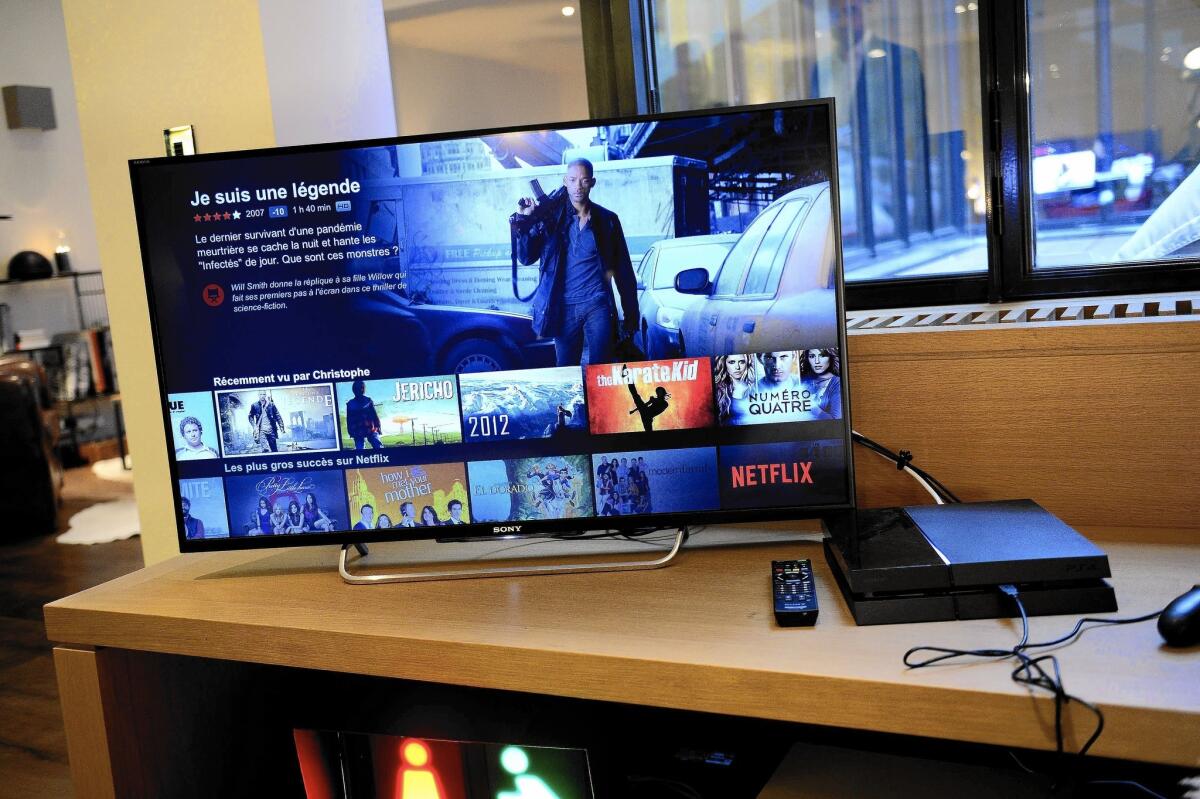Netflix struggles to win over skeptics in film-loving France

As Netflix has spread its video streaming services around the globe, the company’s been met with curiosity, skepticism and, at times, indifference.
But none of the Silicon Valley giant’s adventures abroad generated the mix of fear and anxiety that it has stirred in film-loving France before its launch this month.
In a country of proud cinephiles, Netflix has been bashed by national politicians, vilified by cultural leaders and brushed off by potential broadcast partners who have instead beefed up their own competitive video offerings. These groups worry that Netflix will undermine the complex system created by broadcasters and the government to protect a French film industry that is central to the country’s identity, and a significant part of its economy.
As the headline in Le Monde put it on the eve of Netflix’s launch in France: “Let the Carnage Begin.”
Aware of how it is being perceived, Netflix spent months wooing the French, both in public and behind the scenes. The stakes for the company are high.
Netflix is increasingly dependent on international markets for growth, analysts note, and France is one of the largest countries left to conquer. Yet appealing to local consumers is costly, and the company is promising big investments to acquire and produce local content. To ease cultural fears, executives have tried to make the case that the company will expand consumer choice and film production.
For now, though, the French are skeptical.
“We want to say welcome to Netflix,” said Dante Desarthe, co-chairman of France’s Guild of Authors, Directors and Producers. “But we want them to be respectful of the rules we have created here in France to protect our cinema.”
Last weekend, tucked in the shadows of the Basilica of St. Sernin, a 12th century church that defines the Toulouse skyline, was an irreverent symbol of the French people’s consuming passion for film.
Created in the middle of this southern French city was an encampment called Grovillage, the site of a weeklong film festival dedicated to a cult satire about a fake country called “Groland.”
At Grovillage, organizers and attendees drank and talked about their favorite films from the week against a backdrop of what at first appeared to be small flags strung across the village, but upon closer inspection turned out to be women’s thong underwear. On a wall of a building hung a 20-foot poster of the president of Groland sitting on the Iron Throne from HBO’s “Game of Thrones” wearing a maid’s outfit and no pants.
Not surprisingly, attendees here saw the dust-up surrounding the arrival of Netflix as one more thing to be lampooned.
“The French people will never forgive this American company for changing its name to Netflix just to make it sound more French,” deadpanned Benoit Delepine, a writer and comedian.
“Groland” may be small, but it is just one of the countless film festivals taking place nonstop across France every week. From the streets of small towns to the national centers of power, film is serious business and a constant source of national pride and debate. The French film, TV and video-game industry is a $21-billion business, representing nearly 1% of the country’s gross domestic product. The industry also accounts for 340,000 jobs, or about 1.3% of French employment, according to a 2013 study commissioned by the government.
To nurture and protect the film and television industry, France has created over the years an elaborate set of funding programs and protections.
Some revenue generated by films, TV and video-on-demand services is collected by the government to fund production of more French films and television programs. There is a very strict timetable for releasing films to DVD (four months) and to broadcast TV (up to three years).
French law also requires at least 40% of programming on TV and radio to be made in France. And in the private sector, Canal +, the cable TV group owned by Vivendi, is a major funder of many French films.
It is a carefully balanced system that French cultural leaders fear could topple over with a gentle nudge by Netflix.
“To make our movies, we need a stable system of production,” Desarthe said.
Though the Netflix launch in France this month was part of a broader European expansion, it was here that the company met with the greatest resistance.
Executives from Netflix negotiated with French officials for months over some of the regulations before putting its European headquarters in Amsterdam. The move means the company is exempt from France’s film tax requirements and French-language quotas.
But it also antagonized French cultural leaders.
Then-Culture Minister Aurelie Filippetti criticized Netflix at the time for locating outside France and vowed to protect the country’s cultural heritage. French telecom giant Orange is refusing to put the service on its set-top box, saying it did not want to be a “Trojan horse” for Netflix.
“The French film and TV industry is quite insular,” said Richard Broughton, a London-based analyst at IHS Technology. “There’s a lot of fear that a player like Netflix that is not subject to the same rules as the traditional players may have a disruptive effect.”
The weekend before Netflix went live in France, the company began flying stars of its bespoke programs to Paris. Cast members also campaigned on social media, with actors from “Orange is the New Black” posting photos of themselves near the Seine, the Eiffel Tower, at restaurants and cathedrals.
“Forgot how even the subway signs here are beautiful #Paris #Metro #netflixFR #oitnb #alexvause,” Laura Prepon, who plays Alex Vause, said in on Instagram post.
The courtship continued on Sept. 15 when Netflix Chief Executive Reed Hastings and Chief Content Officer Ted Sarandos held a day of press briefings exclusively for French media. Many of those journalists had been flown out to Netflix’s Los Gatos headquarters in Northern California earlier in the year for interviews. In the evening, Netflix threw a big party at a Paris nightclub, where executives and stars paraded down a red carpet.
Having conquered America, Netflix sees its biggest growth opportunities overseas, where it has just 14 million subscribers compared with 36 million in the U.S. In addition to Germany, where it also launched this month, France is one of the larger remaining markets where Netflix can grow.
Yet the hurdles here remain considerable.
For instance, the company’s biggest show, “House of Cards,” has already been licensed to Canal Play video service.
Netflix also faces stiff competition because consumers have several choices of broadband and pay TV services that come with hundreds of channels and video-on-demand options that cost far less than in the United States.
“That first-mover advantage, that window of opportunity, is gone,” said Mathijs Robbens, a Bain & Co. partner in Amsterdam. “What they need to do is tune their library a little bit for each of these countries and selectively strike partnership deals with operators and broadcasters.”
But Netflix only managed to sign a deal to be carried by one of the smaller French telecom companies, Bouygues. The other carriers have been investing money to create their own streaming services, with one carrier, Numericable, launching the same day as Netflix.
Critics have also said that Netflix’s catalog in France seems thin. The backlash led one anonymous critic to create a website, Notflix.fr, to highlight the movies and TV shows Netflix doesn’t carry.
Netflix made perhaps its most costly bid to win over French filmmakers and consumers this summer when it announced funding for eight episodes of a new French-language series called “Marseille,” which is being billed as a “House of Cards”-style drama about political corruption. The series is set to debut in 2015.
Joris Evers, a Netflix spokesman based in Amsterdam, said the company was accustomed to seeing a bit of controversy when it enters a new region. The company currently has services in more than 40 countries.
“I think generally we see that when Netflix goes into a new market there’s a lot of excitement about the idea of Internet TV and what it is and how it works,” Evers said. “We see existing players and new players enhance their offering. And that’s good for the French consumer.”
There have been some signs of progress by Netflix. One of the most promising can be found in a small, red-brick studio in Roubaix, a northeastern French town near the Belgium border.
This is the headquarters of Ankama, a video-game company with 500 employees that in recent years has branched out into animation. Ankama recently announced a deal with Netflix to carry the French company’s fantasy-action series “WAKFU,” which was already popular in France.
Olivier Comte, Ankama’s chief operating officer, said his company was thrilled with the Netflix partnership, which means its program can now be seen around the world.
“You can’t go against the technology and the consumer’s wishes,” he said. “Streaming and things like this are the future. You have to deal with it.”
Netflix also may have caught a political break.
French President Francois Hollande, under political and economic pressure, recently shook up his Cabinet. Filippetti, the minister of culture who had been a Netflix critic, was replaced last month by Fleur Pellerin, previously a junior minister for the digital economy.
Just a few weeks into her tenure, Pellerin said in a speech that France should “consider the arrival of new players as a development opportunity for our production companies.”
There are also plenty of consumers willing to give the service a try, something that’s relatively painless since Netflix is offering the first month for free.
Raphael Labbe, an entrepreneur in Paris who has been using Netflix for a week, gave it a big thumbs-up.
Labbe said that not only was he impressed with the ease with which he could use it across different devices, but he thought there was more than enough content to make it worth the price.
“It’s a great value and it fits the way I consume movies now,” he said. “People talk about what it doesn’t have. But there’s so much here, more than I can ever watch. I think in four months, after my family is used to Netflix, it might be all we use.”
O’Brien is a special correspondent.







